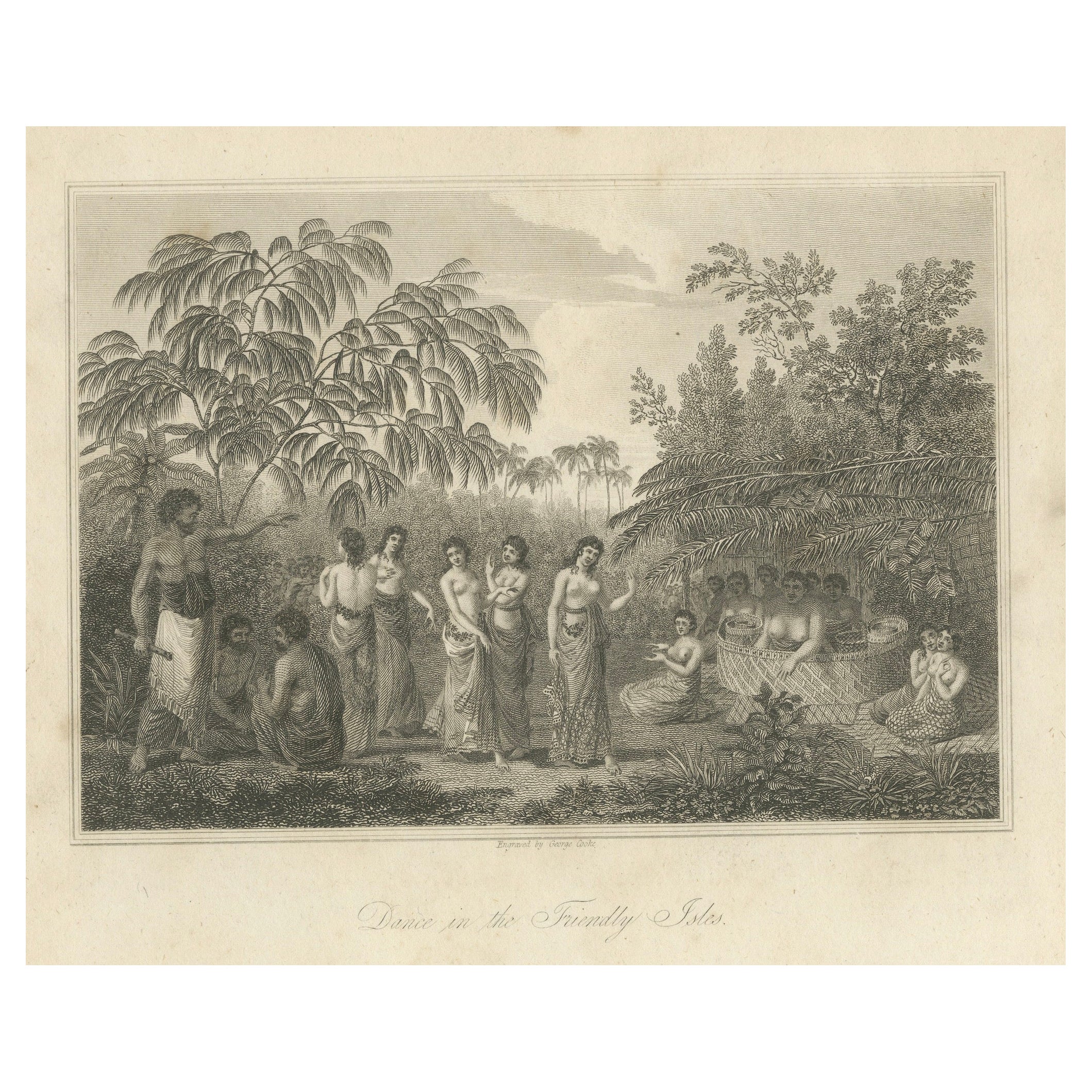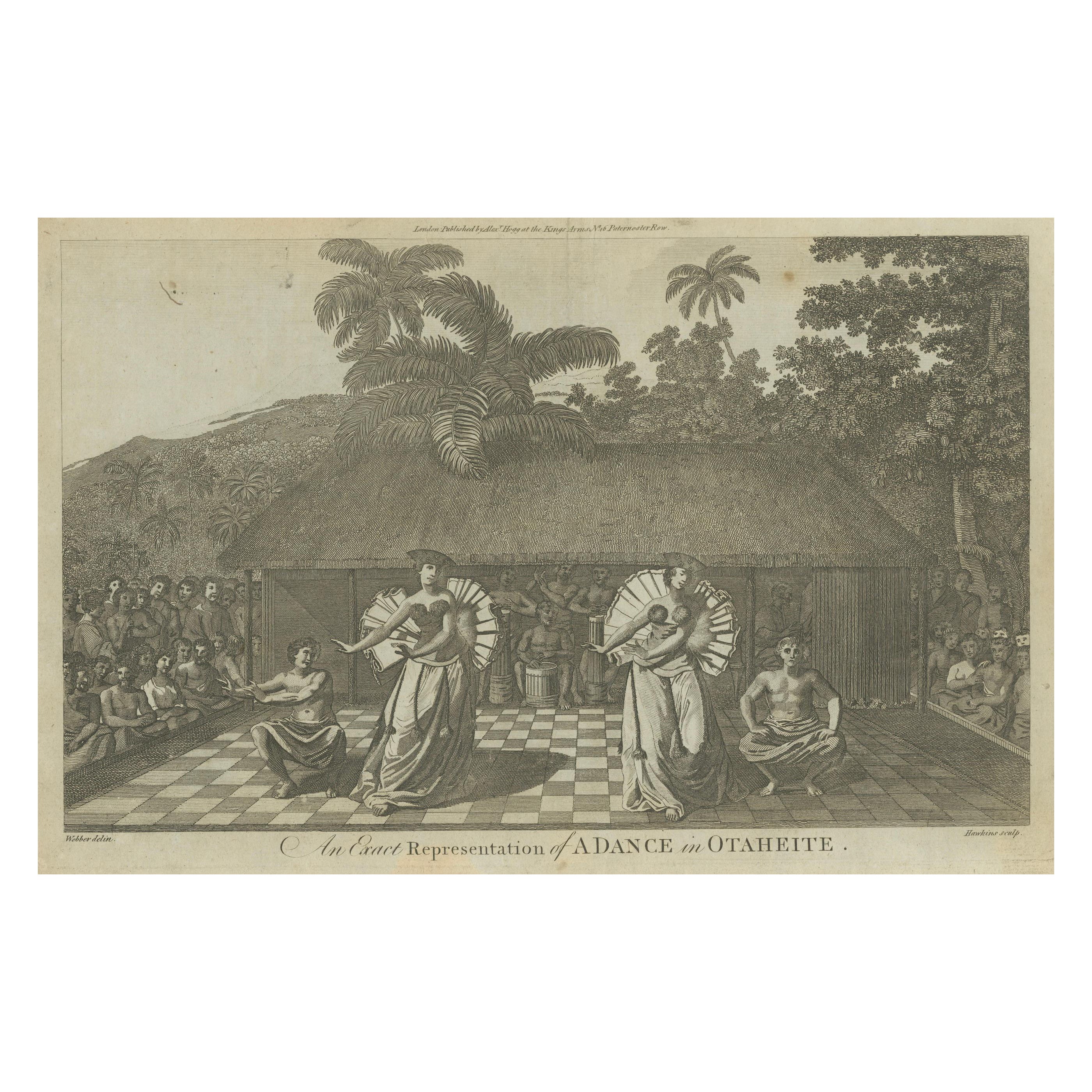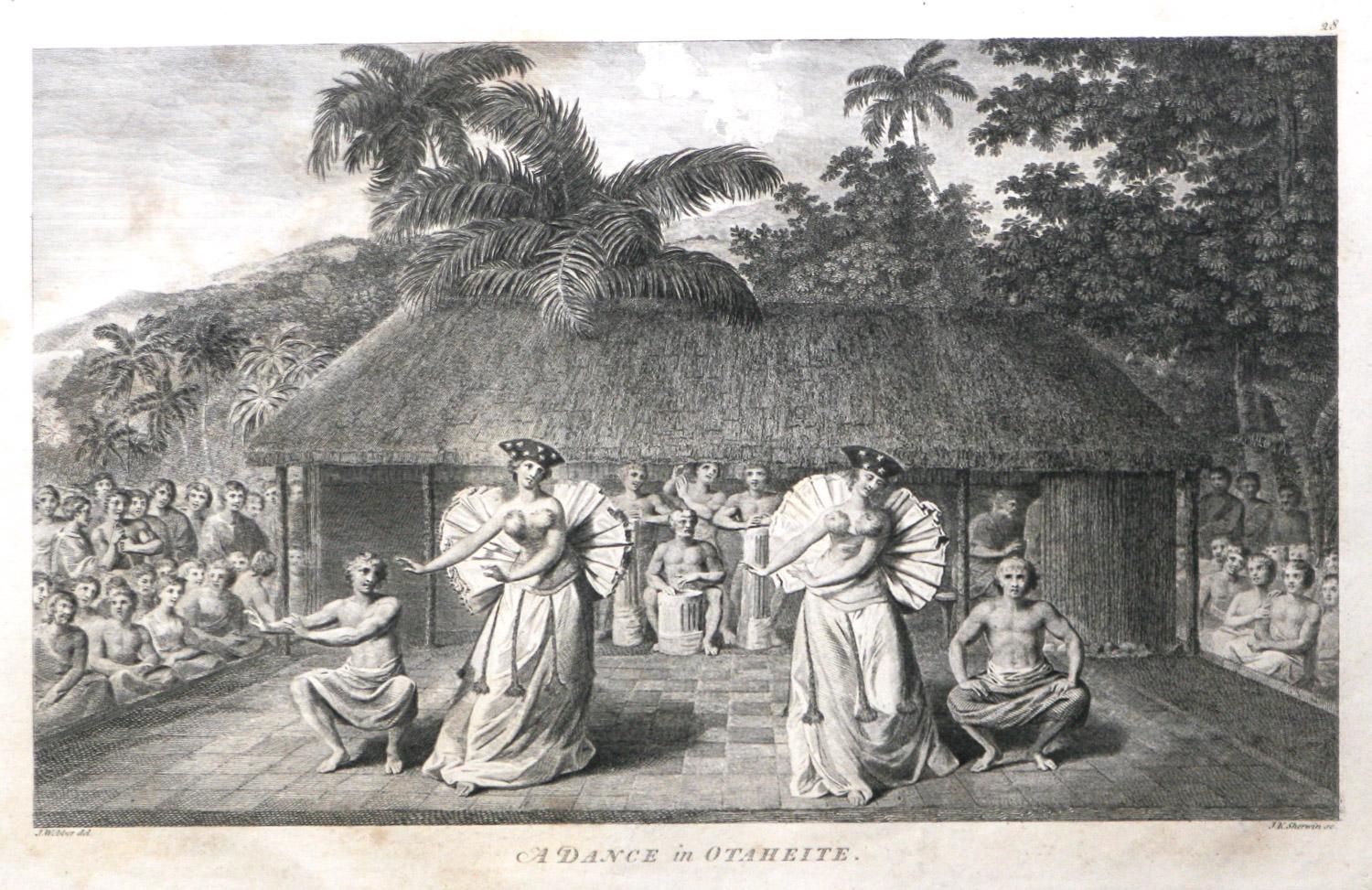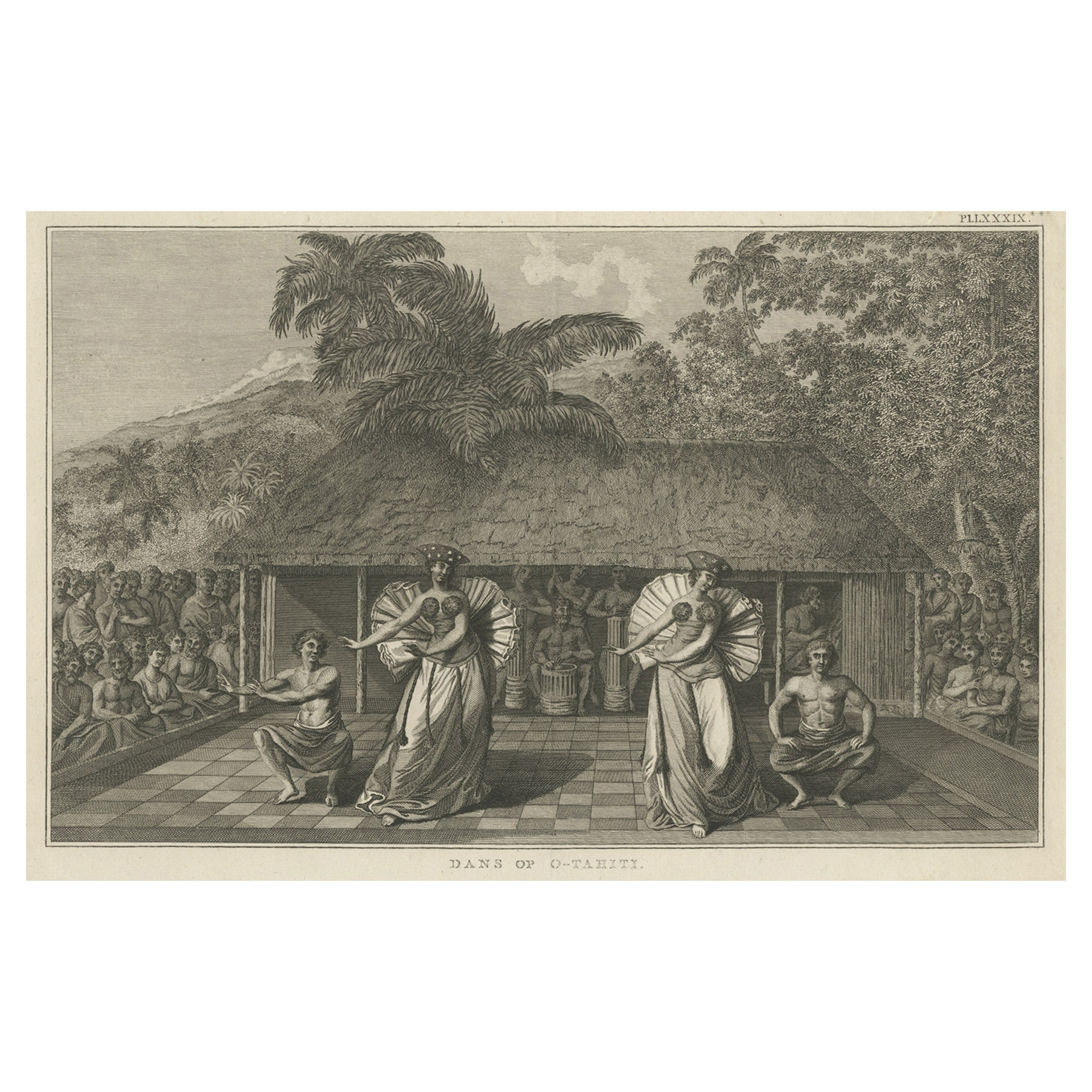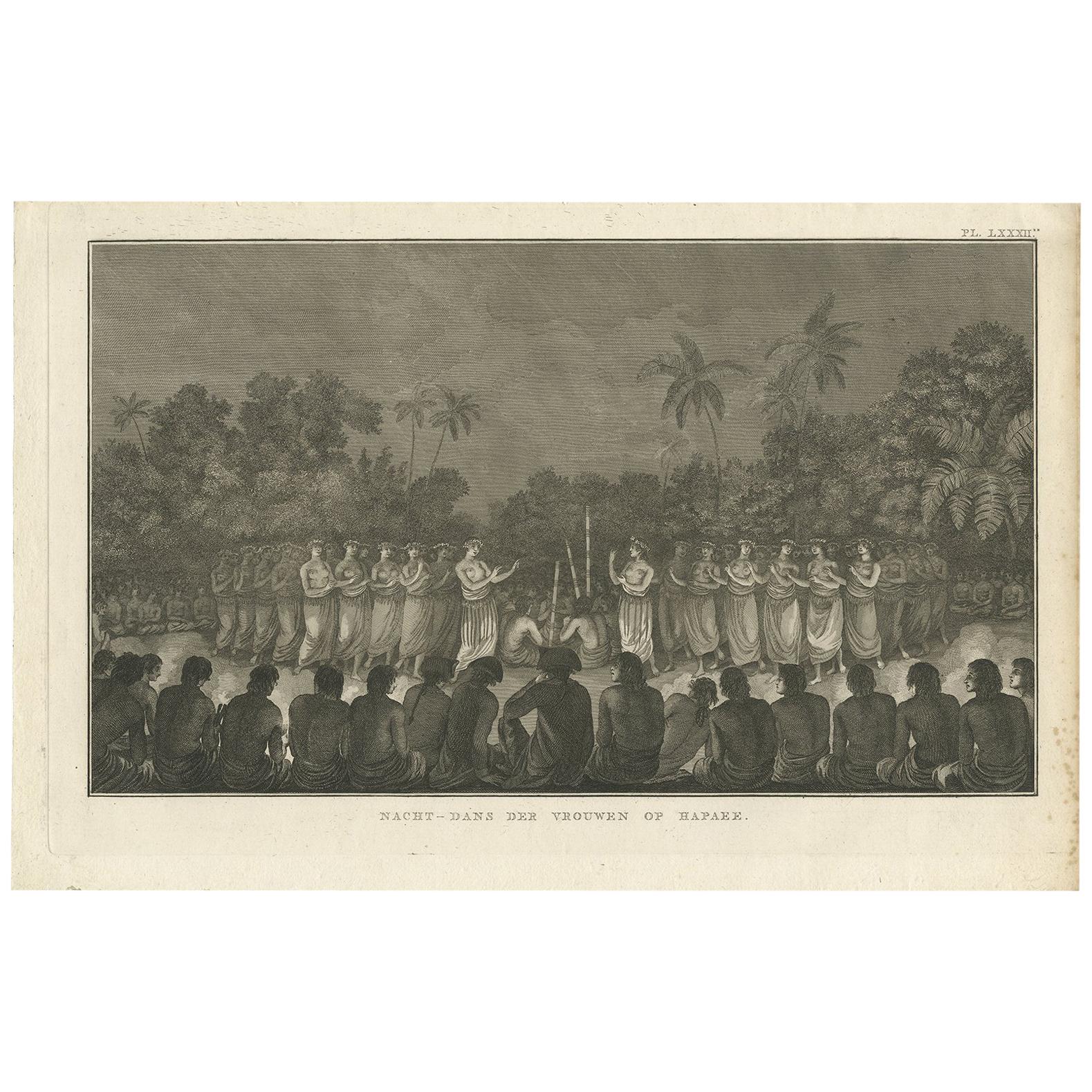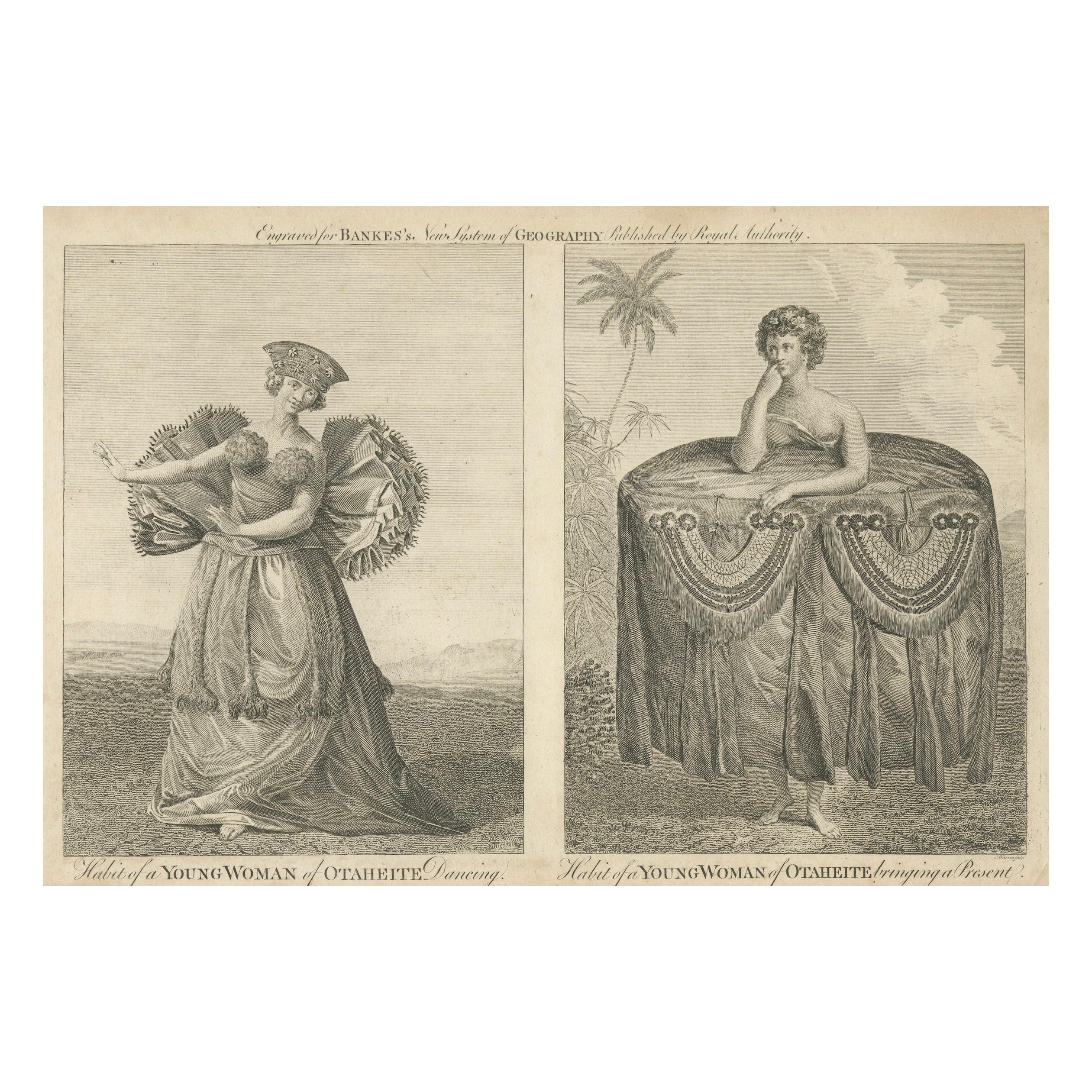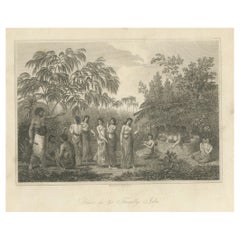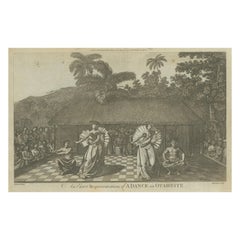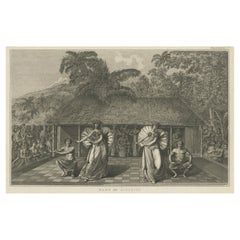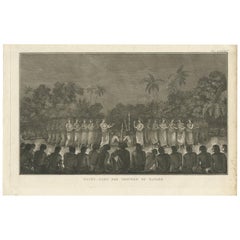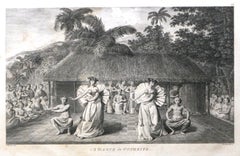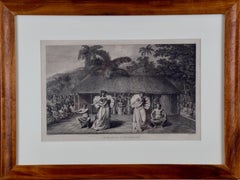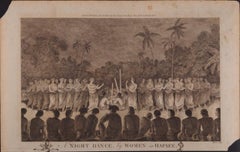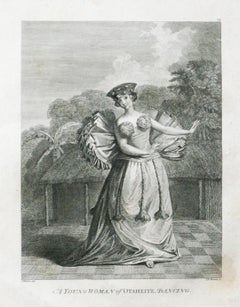Items Similar to A Dance at Ulietea – Society Islands Scene from Cook’s Voyages, c.1784
Want more images or videos?
Request additional images or videos from the seller
1 of 10
A Dance at Ulietea – Society Islands Scene from Cook’s Voyages, c.1784
$409.14
£302.91
€340
CA$566.48
A$618.46
CHF 324.23
MX$7,511.44
NOK 4,049.15
SEK 3,823.48
DKK 2,588.49
About the Item
A Dance at Ulietea – Society Islands Scene from Cook’s Voyages, c.1784
This finely hand-colored copper engraving titled A Dance at Ulietea, one of the Society Islands in the South Seas offers a vivid ethnographic scene based on observations from Captain James Cook’s famous Pacific voyages. Published around 1784, shortly after Cook’s third and final voyage (1776–1780), the print reflects European curiosity and fascination with Polynesian cultures at the close of the 18th century.
The scene is set within a large open wooden structure, likely a community house or ceremonial space, with a thatched roof supported by posts. In the foreground, two Tahitian women perform a traditional dance for an audience of both local men and European observers. The central dancer, bare-chested and adorned with a yellow feathered girdle, moves gracefully with arms lifted, while musicians to the left provide rhythm using flutes and drums.
The composition carefully balances ethnographic detail with classical European artistic conventions. The clothing and body language of the native dancers and musicians are rendered with sensitivity, while the onlookers adopt stances more familiar to neoclassical European genre painting. The inclusion of palm trees in the background further situates the scene in the South Pacific.
The image originates from a plate designed by the artist Webber del. (John Webber, 1751–1793), the official artist on Cook’s third voyage, and engraved by Heath sculp. (likely William Heath or James Heath). Webber's illustrations were instrumental in shaping European understanding and imagery of the Pacific islands during the late Enlightenment. The Society Islands, including Ulietea (modern-day Raiatea), were among the key locations visited by Cook and his crew.
This print was likely published in A New, Authentic, and Complete Account of Voyages Round the World (1784–86), a comprehensive and commercially successful account of Cook’s expeditions, compiled by George William Anderson and others.
Condition: Very good condition with strong original hand coloring. Minor faint spotting in the margins and light toning consistent with age. Wide margins present and well preserved. Visible plate mark.
Framing tips: A dark wood or teak frame with a light cream or parchment mat will complement the tropical subject and 18th-century style. Ideal for collections related to exploration or Polynesian history.
Technique: Copper engraving with original hand coloring
Maker: After John Webber, engraved by Heath, published c.1784, London
- Dimensions:Height: 7.92 in (20.1 cm)Width: 10.44 in (26.5 cm)Depth: 0.01 in (0.2 mm)
- Materials and Techniques:Paper,Engraved
- Place of Origin:
- Period:
- Date of Manufacture:circa 1784
- Condition:Condition: Very good condition with strong original hand coloring. Minor faint spotting in the margins and light toning consistent with age. Wide margins present and well preserved. Visible plate mark.
- Seller Location:Langweer, NL
- Reference Number:Seller: BG-13600-281stDibs: LU3054346172912
About the Seller
5.0
Recognized Seller
These prestigious sellers are industry leaders and represent the highest echelon for item quality and design.
Platinum Seller
Premium sellers with a 4.7+ rating and 24-hour response times
Established in 2009
1stDibs seller since 2017
2,641 sales on 1stDibs
Typical response time: <1 hour
- ShippingRetrieving quote...Shipping from: Langweer, Netherlands
- Return Policy
Authenticity Guarantee
In the unlikely event there’s an issue with an item’s authenticity, contact us within 1 year for a full refund. DetailsMoney-Back Guarantee
If your item is not as described, is damaged in transit, or does not arrive, contact us within 7 days for a full refund. Details24-Hour Cancellation
You have a 24-hour grace period in which to reconsider your purchase, with no questions asked.Vetted Professional Sellers
Our world-class sellers must adhere to strict standards for service and quality, maintaining the integrity of our listings.Price-Match Guarantee
If you find that a seller listed the same item for a lower price elsewhere, we’ll match it.Trusted Global Delivery
Our best-in-class carrier network provides specialized shipping options worldwide, including custom delivery.More From This Seller
View AllRhythms of the Pacific: A Communal Dance in Tonga, Engraving Published in 1812
Located in Langweer, NL
The engraving depicts a serene and communal scene labeled as "Dance in the Friendly Isles." The Friendly Isles is an older name for the Kingdom of Tonga in the South Pacific. This pi...
Category
Antique Early 19th Century Prints
Materials
Paper
$250 Sale Price
20% Off
Free Shipping
Celebration of Tahitian Culture: Traditional Dance at Otaheite, circa 1785
Located in Langweer, NL
An antique engraving depicting a dance scene titled "An Exact Representation of a Dance in Otaheite," Otaheite being an archaic name for Tahiti in French Polynesia. This engraving would have been created as a part of a series to document the culture and life of the Tahitian people, likely observed by European explorers during one of the many voyages to the South Pacific in the 18th century.
In the foreground, there are central figures engaged in a dance, wearing traditional Polynesian attire, which includes wraps around their waists and adornments that seem to represent status or a part of the dance costume. They are holding what appear to be fans, which may be part of the traditional dance. The dancers' poses suggest movement and a performance aspect to the scene.
Behind the dancers, we can see a group of musicians providing the accompaniment, playing drums, which indicates the importance of music and rhythm in the dance. To the right, there is an audience of seated individuals, likely members of the community, watching the performance.
The background of the scene includes thatched huts and a lush landscape with palm trees, depicting a typical village setting in Tahiti. The checkerboard pattern on the ground where the dance takes place is notable, as it adds a sense of structure to the scene.
This image would have been intended for a European audience unfamiliar with Tahitian culture and would have served as a visual record of the encounters between European explorers and the peoples of the Pacific Islands.
The engraving you've uploaded, titled "An Exact Representation of a Dance in Otaheite," is likely from a work documenting the voyages of Captain James Cook, given the style and subject matter. Captain Cook made three voyages to the Pacific Ocean during the 18th century, and his encounters with the peoples of the Pacific, including those of Tahiti (Otaheite), were extensively recorded and published.
The engravings from Cook's voyages were made by artists who accompanied him, such as John Webber on his third voyage, or were based on sketches made by other crew members. These images were then published in the official accounts of the voyages. The most notable of these accounts is "A Voyage to the Pacific Ocean" undertaken during Cook's third voyage from 1776 to 1780, which was published in the years following his death in 1779.
Another possible source for this engraving could be from the accounts of Joseph Banks. Banks was a naturalist who joined Cook on his first voyage (1768-1771) aboard the HMS Endeavour and was responsible for extensive collections and descriptions of Pacific cultures. His collections and later works also included illustrations and engravings of the scenes and peoples encountered.
Given that the engraving is labeled as "London Published as the Act directs by Alexr. Hogg at the Kings Arms...
Category
Antique 1780s Prints
Materials
Paper
$96 Sale Price
20% Off
Antique Copper Plate Engraving Depicting Natives of Tahiti Dancing, 1803
Located in Langweer, NL
Antique print titled 'Dans van O-Tahiti'.
Antique print depicting natives of Tahiti, dancing. Originates from 'Reizen Rondom de Waereld door James Cook (..)'.
Artists and Eng...
Category
Antique Early 1800s Prints
Materials
Paper
$336 Sale Price
20% Off
Antique Print of a Night Dance by Women from Hapaee by Cook, 1803
Located in Langweer, NL
Antique print titled 'Nacht-Dans Vrouwen op Hapaee'. This print depicts a night dance by women from Hapaee. Originates from 'Reizen rondom de Waereld' by J. Cook. Translated by J.D. ...
Category
Antique Early 19th Century Dutch Prints
Materials
Paper
$259 Sale Price
20% Off
Cultural Habits of Tahitian Women: Dance and Ceremony, circa 1790
Located in Langweer, NL
This engraving is titled "Habits of a Young Woman of Otaheite", and it was produced as part of Bankes's New System of Geography, which was a popular geographical work published in th...
Category
Antique 1790s Prints
Materials
Paper
$154 Sale Price
20% Off
Antique Print of Dancing Girl of Otahiti or Tahiti by Cook, 1803
By James Cook
Located in Langweer, NL
Antique print titled 'Een Meisjen van Otahiti danssende'. Antique print depiciting a female native of Tahiti, dancing. Originates from 'Reizen Rondom de Waereld door James Cook (..)'...
Category
Antique 19th Century Prints
Materials
Paper
$231 Sale Price
20% Off
You May Also Like
A Dance in Otaheite (Tahiti) 1784 James Cook Final Voyage by John Webber
By John Webber
Located in Paonia, CO
A Dance in Otaheite ( Tahiti ) is from the 1784 First Edition Atlas Accompanying Capt. James Cook and King; Third and Final Voyage of Captain James Cook. John Webber (1752-1793) who...
Category
1780s Realist Figurative Prints
Materials
Engraving
"A Dance in Otaheite" (Tahiti), Engraving from Captain Cook's 3rd Voyage
By John Webber
Located in Alamo, CA
"A Dance in Otaheite" (Tahiti) is an engraving created by William Sharp (1749-1824), from a drawing by John Webber (1752-1793), who was the artist on Captain James Cook's 3rd and final voyage of discovery. It is a plate in the atlas of "A Voyage to the Pacific Ocean Undertaken by the Command of His Majesty, for Making Discoveries in the Northern Hemisphere", the official British Admirality sanctioned journal published upon completion of the voyage in London in 1784 by Strahan & Cadell.
Two women and two men wearing ceremonial costumes, performing a dance outdoors standing on a mat. Three men are playing the drums in the background, in front of a thatched roof building. An audience of men are sitting on both sides of the stage. By the time Webber arrived in Tahiti, 'south sea' imagery had become familiar. Webber gave concentrated attention to dance. He had the opportunity to distinguish the Tahitian dance from the more formalized dancing of Tonga. Whereas they seem to have called to mind the more formal dances of antiquity, the Tahitian dancing aroused memories of peasant and folk dancing.
This engraving is professionally framed in Koa wood. Koa wood is legendary in Hawaii. Not only is this amazing wood native to Hawaii, but it is known for the deep rich colors and varied grain pattern. Koa has an honored heritage in Hawaii and is highly revered and sacred. The word “koa” means “warrior” in Hawaiian. The warriors of King Kamehameha the Great, created canoes and weapons from a wood plentiful on the Big Island of Hawaii. This wood became synonymous with the warriors themselves, and it became known as koa.
The print is in excellent condition.
There are three other engravings listed from the official journal of Captain Cook's 3rd voyage available that are presented in identical Koa wood frames and double mats (LU117324682432, LU117324684052, LU117324684062). They would make a wonderful grouping for a display of 2, 3 or 4 prints. A discount is available for a grouping depending on the number of items included.
Hawaii was discovered by Captain Cook during this voyage. Hawaii was originally called The Sandwich Islands in honor of The Earl of Sandwich...
Category
1780s Realist Landscape Prints
Materials
Engraving
A Night Dance by Women in Tonga: Original 18th C. Engraving, Cook's 3rd Voyage
By John Webber
Located in Alamo, CA
"A Night Dance by Women in Hapaee" is an original 18th century engraving from a drawing by John Webber (1751-1793), who was the artist who accompanied Captain Cook on his third voyag...
Category
1780s Landscape Prints
Materials
Engraving
A Young Woman of Otaheite, Dancing (Tahiti) 1784 Captain Cooks Voyage by Webber
By John Webber
Located in Paonia, CO
A Young Woman of Taheite Dancing (Tahiti) is from the 1784 First Edition Atlas Accompanying Capt. James Cook and King; Third and Final Voyage of Captain James Cook.John Webber (1752-...
Category
1780s Realist Figurative Prints
Materials
Engraving
A Night Dance by Men in Tonga: An Original 18th C. Engraving, Cook's 3rd Voyage
By John Webber
Located in Alamo, CA
"A Night Dance by Men in Hapaee" is an original 18th century engraving from a drawing by John Webber (1751-1793), who was the artist who accompanied Captain Cook on his third voyage ...
Category
1780s Landscape Prints
Materials
Engraving
Balok Dancers - Lithograph - 1862
Located in Roma, IT
Customs -Balok Dancers is a Hand-colored lithograph on paper realized in 1862.
Titled on the lower.
The artwork belongs to the Suite Uses and customs of all the peoples of the univ...
Category
1860s Modern Figurative Prints
Materials
Lithograph
More Ways To Browse
Japanese Root Wood
Japanese Scroll Flower
Japanese Shell Art
Japanese Sword Furniture
Jean Roger Paris
Jiaqing Porcelain
Karl Muller
Kodak Vintage
Lane Cedar Chest
Large Block Prints
Large Ceramic Cat
Large Chinese Foo Dogs
Large Giraffe Sculpture
Large Menorah
Lattice Dining Table
Le Nid
Leaping Gazelle
Leather Rhino
